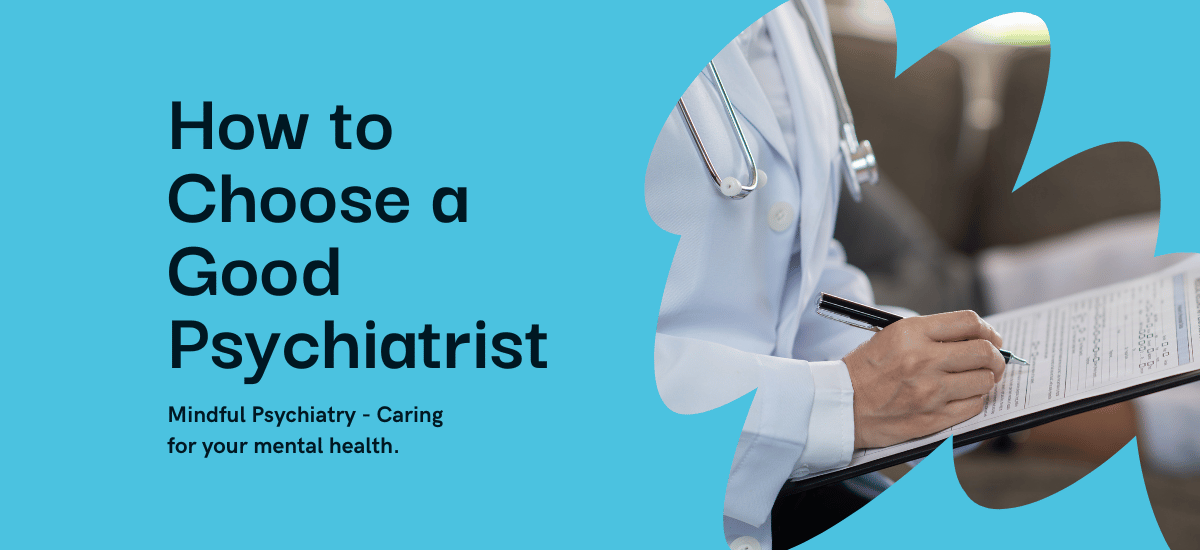How To Find & Choose A Good Psychiatrist

Psychiatrists are medical doctors who specialize in the diagnosis, treatment, and prevention of mental illnesses. They have completed medical school and have also completed a psychiatric residency, during which they receive specialized training in the diagnosis and treatment of mental health conditions.
Psychiatrists are uniquely qualified to evaluate both the physical and psychological aspects of mental illness. They are able to prescribe medication, perform medical procedures such as electroconvulsive therapy (ECT), and provide therapy, as well as other forms of treatment.
Why Is Finding a Psychiatrist So Hard?
Limited availability: There is a shortage of psychiatrists, particularly in certain areas, which can make it difficult to find one who is accepting new patients.
Long wait times: Even if you are able to find a psychiatrist, you may have to wait a long time for an appointment. This can be particularly challenging for individuals who are in crisis or need urgent care.
Stigma and lack of information: Many people may not be aware of the services that a psychiatrist can offer, and may not know how to find one. Additionally, the stigma surrounding mental health can make it difficult for some people to seek help.
Cost: The cost of psychiatry services can be high, and many people may not be able to afford it, especially if they have a high-deductible insurance plan or no insurance at all.
Specialization: Finding a psychiatrist who specializes in treating your specific condition or has experience working with similar cases can be a challenge.
Quality: Finding a psychiatrist who is reputable, experienced, and has a good track record can be hard.
Limited resources: In some areas, especially in rural areas, there might be very limited resources and options for psychiatric services
9 Tips for Searching for a Psychiatrist
-
Get referrals
Ask your primary care physician, therapist, or other trusted healthcare professionals for recommendations. You can also ask friends, family members, or support groups for recommendations. -
Check credentials
Make sure the psychiatrist is licensed and board-certified in psychiatry. You can check this information on the American Board of Psychiatry and Neurology’s website. -
Research their expertise
Look for a psychiatrist who specializes in treating your specific condition or has experience working with similar cases. -
Look at their availability
Consider how easy it is to schedule an appointment with the psychiatrist and how flexible their hours are. -
Check for insurance coverage
Make sure the psychiatrist is covered by your insurance and understand the coverage details. -
Look for online reviews
Check online reviews from former patients, or try to reach out to people who have had experience with the psychiatrist -
Consider telemedicine
Telemedicine has made it much easier for people to obtain mental health care, especially if they live in an area where there are few options for treatment. Even if you plan on seeing a local psychiatrist, online services can make treatment more convenient and affordable. Check if psychiatrists in your area offer telehealth services and look at online psychiatry providers. -
Schedule a consultation
If possible, schedule a consultation with the psychiatrist before committing to treatment. This will give you a chance to meet the doctor, ask questions, and decide if they’re the right fit for you. -
Trust your gut
Remember, you’ll be working closely with this individual, so it’s important to choose someone you feel comfortable with and trust.
Choosing the right psychiatrist can be a daunting task, but by following these steps and taking the time to research your options, you can find a healthcare professional who is the right fit for you and your needs. Remember, it’s okay to see more than one psychiatrist before finding the right one and don’t hesitate to switch if you don’t feel comfortable or if you’re not seeing progress.
Related Articles

Letting Go With Grace: Emotional Tools for Closure
Letting go is never easy. Whether we are parting ways with a loved one, ending a relationship, leaving a job, or saying goodbye to a cherished chapter of life, the emotional weight can feel overwhelming. Yet, closure is essential for our emotional well-being. Without it, we carry unresolved grief, anger, regret, or longing that can seep into new relationships and experiences, holding us back from healing and growth.

Breakup Blues: How to Cope and Rebuild Your Self-Worth
A breakup often feels like a silent earthquake—unseen by others but devastating within. The pain doesn’t just come from the loss of a relationship, but from the crumbling of the life, identity, and future you built with another person. You may find yourself questioning your worth, doubting your value, and feeling isolated even when surrounded by people. In Indian society, where emotional expression is often discouraged and breakups can be stigmatized, this pain may feel even more overwhelming. But the truth is—while breakups may shake you, they do not define you. You are not broken; you are in a process of emotional reformation. And with the right tools, guidance, and support system, you can rebuild not just your self-worth but also your entire life narrative.

Healing After Heartbreak: A Mental Health Perspective
Heartbreak doesn't just break your heart—it can shatter your sense of identity, peace, and purpose. Whether the end was expected or abrupt, mutual or one-sided, short-lived or long-term, the aftermath often leaves people emotionally disoriented. In Indian culture, where societal expectations and family involvement in romantic relationships are prevalent, the pain is not just personal—it is public. Yet, very few are taught how to heal from emotional loss in a healthy, sustainable way.

Boundaries in Love: Saying ‘No’ Without Guilt
Love, in its truest form, should be a safe space—a space where individuality is not only respected but celebrated. Yet, in many relationships, especially in the Indian cultural context, love is often misunderstood as constant availability, complete sacrifice, and putting the other person first, always. As noble as this may sound, this version of love often leads to emotional exhaustion, suppressed resentment, and the erosion of one’s identity.

Gaslighting in Relationships: What It Is and How to Heal
Gaslighting is a form of emotional abuse that erodes your ability to trust your own perception. It’s a slow, insidious process that often begins with subtle doubts and ends with complete self-questioning. In romantic relationships—especially in the Indian context where silence, compromise, and duty are often mistaken for love—gaslighting can be even harder to recognize.

How Depression Can Affect Your Relationship—And What You Can Do
Depression is not just an internal struggle—it ripples outward, affecting relationships, routines, and the emotional fabric that holds people together. When someone is dealing with depression, it's not only their world that becomes dim—it can cast a shadow over their most intimate connections too. In a country like India, where open conversations about mental health are still rare and love is often equated with endurance, depression within a relationship can become invisible, misunderstood, or misjudged.
